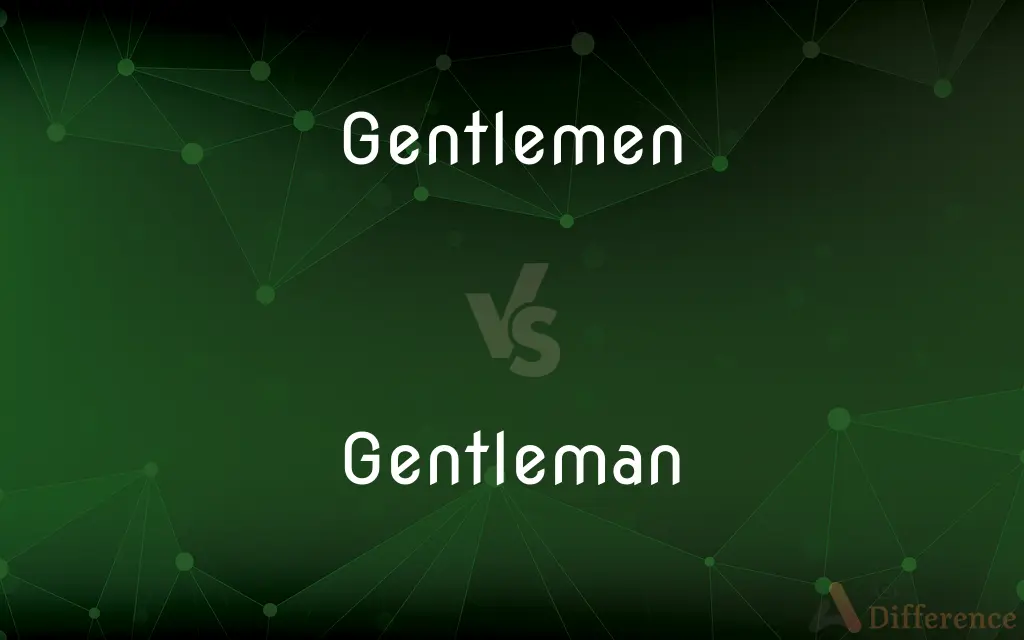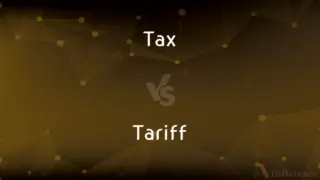Gentlemen vs. Gentleman — What's the Difference?
By Tayyaba Rehman — Updated on September 17, 2023
Gentlemen is the plural form, referring to more than one such man, while Gentleman is singular, referring to one well-mannered man.

Difference Between Gentlemen and Gentleman
Table of Contents
ADVERTISEMENT
Key Differences
Gentleman and Gentlemen are both terms rooted in chivalry, with the primary difference being number. Gentleman refers to a singular male individual, often implying good manners or a certain social status. In contrast, Gentlemen is the plural form, denoting more than one such individual.
Historically, the term Gentleman was used to describe a man of noble birth or one who owned land. Gentlemen, its plural counterpart, described a group of such men, often attending social or official functions.
Over time, Gentleman evolved to reflect not just birthright but character, indicating a man with courteous demeanor and integrity. Similarly, when one addresses a group with "Ladies and Gentlemen," it's an acknowledgment of the audience's collective civility.
In modern usage, while Gentleman still maintains its singular form to address or describe a man of respect, Gentlemen is commonly used as a polite address, like in public announcements or formal gatherings.
The nuances between Gentleman and Gentlemen, while subtle, highlight the richness of the English language and its ability to distinguish between singular and plural, history and contemporary usage, within just a letter's difference.
ADVERTISEMENT
Comparison Chart
Number
Plural.
Singular.
Historical Implication
Group of men of noble birth or landowners.
One man of noble birth or landownership.
Modern Usage
Address for a group in formal settings.
Describes one well-mannered man.
Example Address
"Ladies and Gentlemen..."
"The Gentleman in the suit..."
Common Associations
Gatherings, formal announcements, groups.
Individual, respect, courtesy.
Compare with Definitions
Gentlemen
The plural of Gentleman.
The Gentlemen convened for a meeting.
Gentleman
Used as a courteous reference.
Would the Gentleman like some coffee?
Gentlemen
Multiple male individuals with courtesy and respect.
The Gentlemen assisted the stranded motorist.
Gentleman
A well-mannered or noble man.
He behaved like a true Gentleman.
Gentlemen
Group of well-mannered men.
The Gentlemen stood when she entered the room.
Gentleman
A man of good family, breeding, or social position.
The Gentleman owned vast acres of land.
Gentlemen
Men of noble standing or rank.
The hall was filled with Gentlemen of the court.
Gentleman
Reflecting chivalry and politeness.
He is a Gentleman in every sense of the word.
Gentlemen
Address for a male audience in a formal setting.
Good evening, Ladies and Gentlemen.
Gentleman
A gentleman (Old French: gentilz hom, gentle + man) is any man of good and courteous conduct. Originally, gentleman was the lowest rank of the landed gentry of England, ranking below an esquire and above a yeoman; by definition, the rank of gentleman comprised the younger sons of the younger sons of peers, and the younger sons of a baronet, a knight, and an esquire, in perpetual succession.
Gentlemen
A man of gentle or noble birth or superior social position
"He's too much a gentleman to be a scholar" (Aphra Behn).
Gentleman
A man of gentle or noble birth or superior social position
"He's too much a gentleman to be a scholar" (Aphra Behn).
Gentlemen
A well-mannered and considerate man with high standards of proper behavior. See Usage Note at lady.
Gentleman
A well-mannered and considerate man with high standards of proper behavior. See Usage Note at lady.
Gentlemen
A man of independent means who does not need to have a wage-paying job.
Gentleman
A man of independent means who does not need to have a wage-paying job.
Gentlemen
A man
Do you know this gentleman?.
Gentleman
A man
Do you know this gentleman?.
Gentlemen
Gentlemen (-mən) Used as a form of address for a group of men.
Gentleman
Gentlemen (-mən) Used as a form of address for a group of men.
Gentlemen
A manservant; a valet.
Gentleman
A manservant; a valet.
Gentlemen
Plural of gentleman
Gentleman
A man of gentle but not noble birth, particularly a man of means (originally ownership of property) who does not work for a living but has no official status in a peerage; an armiferous man ranking below a knight.
Being a gentleman, Robert was entitled to shove other commoners into the gongpit but he still had to jump out of the way of the knights to avoid the same fate himself.
Gentlemen
Alternative form of gentlemen's: a men's room, a lavatory intended for use by men.
Gentleman
Any well-bred, well-mannered, or charming man.
Gentleman
An effeminate or oversophisticated man.
Well, la-di-da, aren't you just a proper gentleman?
Gentleman
Any man.
Please escort this gentleman to the gentlemen's room.
Gentleman
An amateur or dabbler in any field, particularly those of independent means.
Gentleman
(cricket) An amateur player, particularly one whose wealth permits him to forego payment.
Gentleman
A man well born; one of good family; one above the condition of a yeoman.
Gentleman
One of gentle or refined manners; a well-bred man.
Gentleman
One who bears arms, but has no title.
Gentleman
The servant of a man of rank.
The count's gentleman, one Cesario.
Gentleman
A man, irrespective of condition; - used esp. in the plural (= citizens; people), in addressing men in popular assemblies, etc.
Gentleman
A man of refinement
Gentleman
A manservant who acts as a personal attendant to his employer;
Jeeves was Bertie Wooster's man
Gentleman
A polite term for a man.
The Gentleman at the door wishes to speak with you.
Common Curiosities
Is the term Gentlemen commonly used in announcements?
Yes, "Ladies and Gentlemen" is a frequent formal address.
Is the main difference between Gentlemen and Gentleman the number?
Yes, Gentleman is singular while Gentlemen is plural.
Can Gentleman imply a certain social status?
Historically, it did refer to a man of noble birth or one who owned land.
Does Gentleman nowadays primarily refer to behavior and manners?
Yes, it often indicates a man with courteous demeanor and integrity.
Was Gentleman historically tied to land ownership?
Yes, it often referred to a man who owned land or was of noble birth.
Is "Ladies and Gentlemen" still a common greeting?
Yes, it's a common formal address, especially in public announcements.
If I'm talking about one man's good behavior, which term should I use?
"Gentleman" would be the correct term.
What's the opposite of Gentlemen?
"Ladies" is often used as the counterpart in address.
Can Gentleman be used to describe a person's character?
Absolutely, it can indicate a man of good character and manners.
How do I address multiple men of respect?
You can use the term "Gentlemen."
Are Gentlemen and Gentleman dated terms?
While rooted in history, both terms are still used in modern English, especially in formal settings.
In a formal event, how should I address the male attendees?
"Gentlemen" would be an appropriate address.
Is "Gentleman's agreement" a common phrase?
Yes, it refers to an agreement based on trust, without any written contract.
How has the definition of Gentleman evolved over time?
While it once emphasized noble birth or land ownership, it now often focuses on character and manners.
Can Gentleman be used as a title, like "Mr."?
Not commonly as a title, but it can be used as a polite form of address.
Share Your Discovery

Previous Comparison
Tax vs. Tariff
Next Comparison
Flavor vs. FlavourAuthor Spotlight
Written by
Tayyaba RehmanTayyaba Rehman is a distinguished writer, currently serving as a primary contributor to askdifference.com. As a researcher in semantics and etymology, Tayyaba's passion for the complexity of languages and their distinctions has found a perfect home on the platform. Tayyaba delves into the intricacies of language, distinguishing between commonly confused words and phrases, thereby providing clarity for readers worldwide.














































